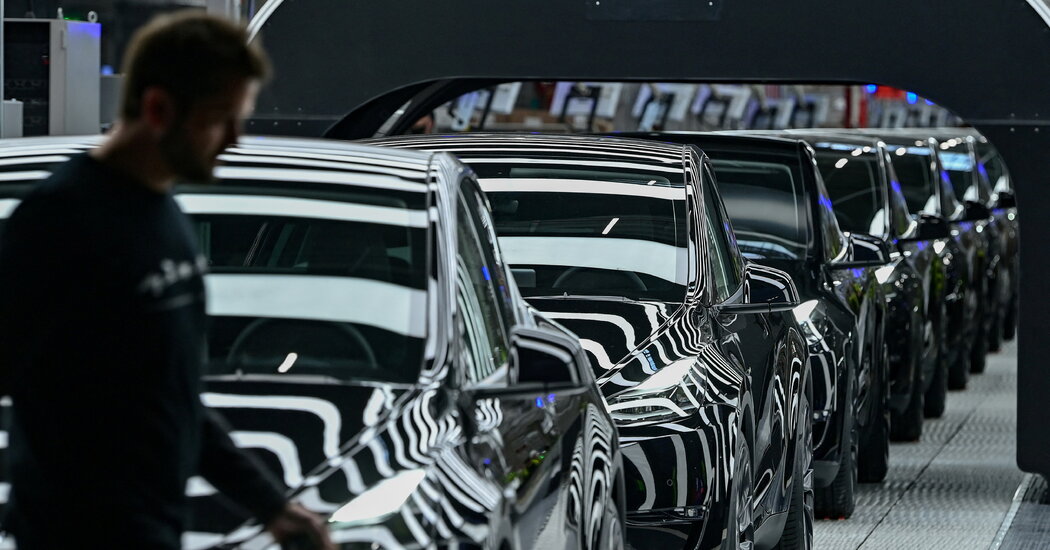Tesla CEO Elon Musk plans to cut 10 percent of the electric car maker’s salaried workforce, he told staff in an email on Friday.
The job losses will not affect workers who build cars or batteries or install solar panels, and the number of workers per hour will increase, Mr Musk said in the email, a copy of which was reviewed by The New York Times. “Tesla will reduce the number of salaried employees by 10 percent because we are overstaffed in many areas,” he said.
Reuters reported the news earlier, citing another email Mr Musk sent only to Tesla executives. The automaker’s stock price closed about 9 percent lower Friday after that article was published.
Tesla’s workforce has grown significantly as sales have increased and it has built new factories, including two that opened this year near Berlin and Austin, Texas. The company employed more than 99,000 employees at the end of last year. Just two years earlier, Tesla had 48,000.
Mr. Musk and Tesla did not respond to requests for comment.
Earlier this week, Mr. Musk told employees of Tesla and SpaceX, his rocket company, that they were expected to spend at least 40 hours a week in their offices.
“The higher you are, the more visible your presence should be,” Musk said in an email to SpaceX employees on Tuesday. “That’s why I spent so much time in the factory so those on the line could see me working next to them. If I hadn’t, SpaceX would have been bankrupt long ago.”
That announcement sparked Mr. Musk and his companies into a hotly contested debate over the right approach to restore normalcy after two chaotic years of the pandemic. It also raised concerns that he might drive away top performers who would rather work remotely for some or all of the time.
The new layoffs won’t be the first at Tesla. The automaker also laid off some employees in 2017 and 2018.
In recent weeks, investors have begun to question the company’s skyrocketing share price. The market values the company at more than $728 billion, more than several other major automakers combined. Shares of Tesla are down about 40 percent from their highs at the end of last year, drawing attention to the risks the company faces from increasing competition, allegations of racial discrimination and production problems at the Shanghai plant.
Some critics view Mr. Musk’s bid to buy Twitter as yet another distraction that could harm Tesla. A major concern for some investors is that the automaker’s board of directors is not sufficiently independent from the chief executive to keep an eye on him and his impulses.
How Elon Musk’s Twitter Deal Unfolded
A blockbuster deal. Elon Musk, the world’s richest man, put an end to what seemed an unlikely attempt by the famed mercurial billionaire to buy Twitter for about $44 billion. Here’s how the deal unfolded:
“From a corporate governance perspective, Tesla has a lot of red flags,” Andrew Poreda, a senior analyst specializing in socially responsible investing at Sage Advisory Services, an Austin-based investment firm, told The Times last month. “There are almost no checks and balances.”
Musk’s management style and success — he is listed by Bloomberg and Forbes as the world’s richest man — have earned him admirers, but have made him a lightning rod. Tesla has lost a number of top executives in recent years, many of whom have moved on to top positions at other automakers, tech companies and battery makers.
Recently, Mr. Musk praised the work ethic in China, where working conditions can be harsh or even abusive, suggesting that workers in the United States were lazy. “They won’t just burn the midnight oil. They will burn the oil from 3 a.m.,” he said of Chinese workers in an interview with The Financial Times. “So they won’t even leave the factory-like stuff. While in America people try not to go to work at all.”
Still, some analysts remain optimistic about Tesla’s prospects. “In our view, Tesla probably won’t need to hire more employees to sustain its growth, and we think the plan to reduce its workforce likely shows that Tesla hired too much last year,” said Seth Goldstein, senior equity analyst at Morningstar, said in a note Friday.

